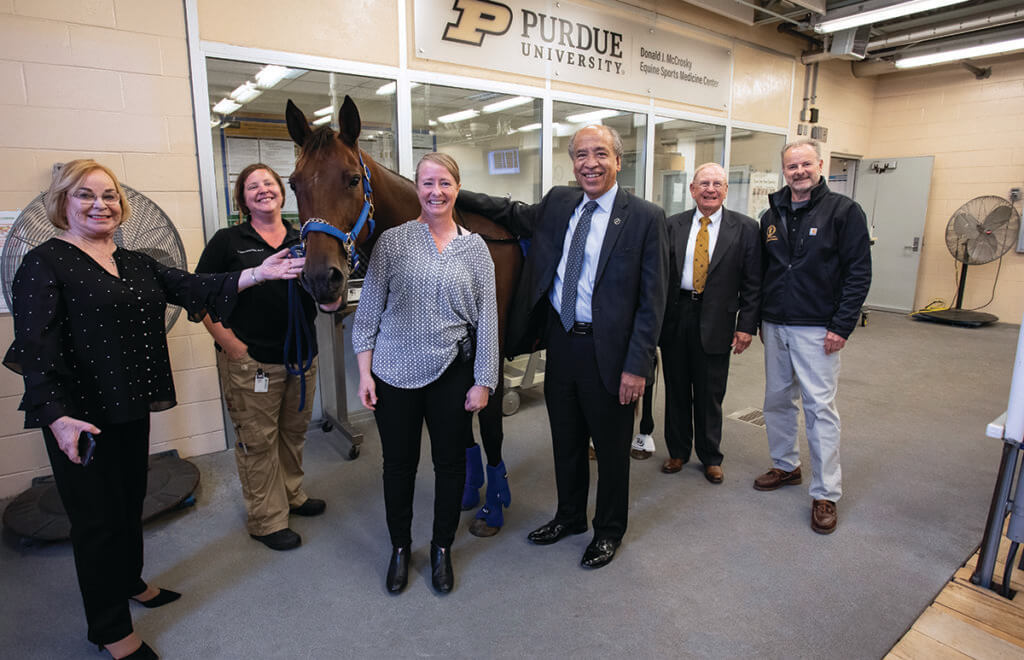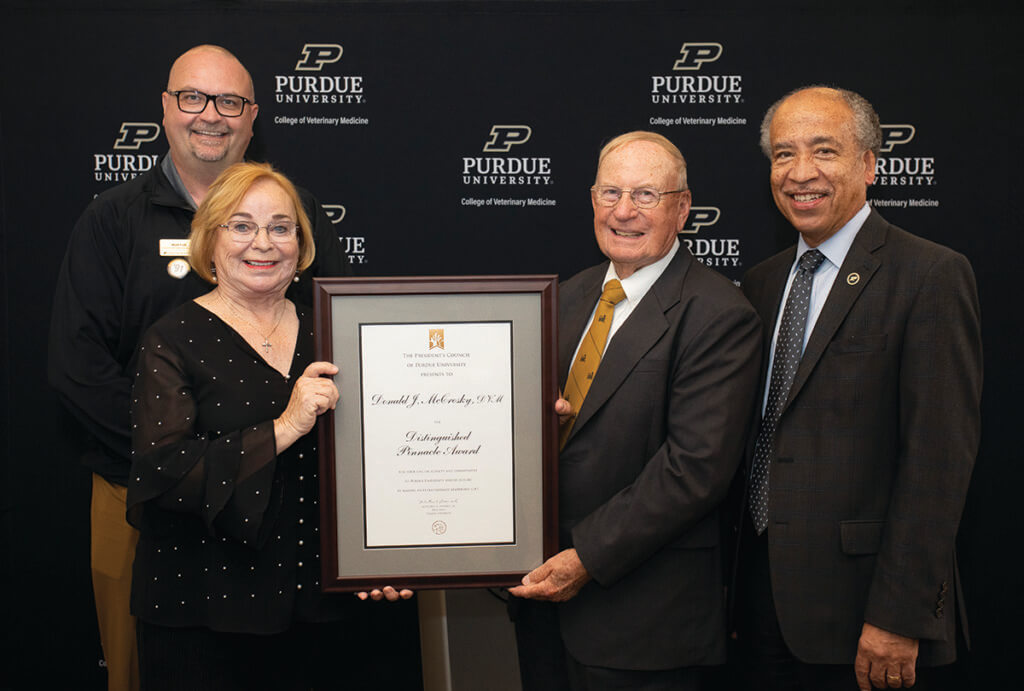
The significance and appropriateness of the moment was patently evident to Purdue Veterinary Medicine Dean Willie Reed as he spoke to the people who gathered at Lynn Hall to honor alumnus and longtime equine veterinarian Don McCrosky and his wife, Lois, of Waterloo, Illinois, for their gift to support Equine Sports Medicine. “You know, Don, it is so fitting that you and Lois do this,” Dean Reed said. Turning to the others in the room, he continued, “I’ve learned a little about Don’s history… when he was five years old he learned how to manage his father’s team of horses. And then his grandfather gave him his first horse. So, he’s had a love affair with horses his whole life.”
That love affair now is reflected in the identity of the Donald J. McCrosky Equine Sports Medicine Center, named in recognition of a $3 million gift from the McCroskys. “And so, at five years old, I bet you couldn’t have envisioned today,” Dean Reed said to Dr. McCrosky at the ceremony September 23. “But look at how things have happened. What you’re now able to do for horses is just a wonderful and fitting thing.”
In expressing his appreciation for the McCroskys’ support, the Equine Sports Medicine Center director, Dr. Laurent Couëtil, professor of large animal internal medicine, said he looks forward to the multifaceted impact that the gift will have in the years to come. “When I came to Purdue 27 years ago it was to help launch the Equine Sports Medicine Center and pari-mutuel betting had just been approved in the state,” Dr. Couëtil explained. “The Indiana legislature had the foresight to set aside $150,000 per year from taxes on pari-mutuel revenues to benefit equine research. And that really was foundational for us to be able to accomplish what we are doing.” Dr. Couëtil went on to explain how that investment supported more than 70 research projects totalling almost $1 million over that 20 year period. “That has led to many discoveries that have benefitted horses across the globe, literally. And with your gift of $3 million we will be able to double our research effort going forward. And we will be able to train the next generation of equine researchers, which is obviously very exciting to me, because that will be our legacy later on — that is what we can pass on.”

The recognition ceremony followed a demonstration of the center’s high speed equine treadmill. The McCroskys had a front row view of a horse running in place at full gallop, below a sign that bears the new name of the Donald J. McCrosky Equine Sports Medicine Center. The McCroskys also met some of the staff and students who work and learn in the center. “We can’t thank you enough for this amazing gift,” Dr. Couëtil told the McCroskys. “It will lay a strong foundation for us to continue the sports medicine and the research that we do, and the excellent practice that we also do at Purdue. I think it is a wonderful opportunity for the college, for the faculty and for the students to make a long-lasting impact on our patients and horse owners in Indiana and beyond.”
The afternoon’s program concluded with CEO of the Purdue for Life Foundation, Matt Folk, presenting the Purdue President’s Council Distinguished Pinnacle Award to Dr. McCrosky, a distinction reserved for those who have reached a pinnacle in giving with the university. Noting that Dr. McCrosky earned his Purdue DVM degree in 1968 before opening his own practice in southwestern Illinois, which included small and large animals, Folk explained how the small animal practice was sold in 2004 so Dr. McCrosky could focus solely on equine medicine, specializing in reproduction. Folk added that beyond the veterinary practice, the McCroskys own more than 50 race horses and brood mares and race their horses in the Chicago and St. Louis areas. In addition to naming the center, Dr. McCrosky also has supported both of the College of Veterinary Medicine’s Equine Hospitals, including the Caesars Entertainment Equine Specialty Hospital in Shelbyville, Indiana, and the new David and Bonnie Brunner Equine Hospital on the Purdue campus.
“This is a joy to me,” Dr. McCrosky said as he accepted the award. “I’m very happy that I was able to do it. Purdue has meant a lot to me. I wouldn’t be where I am if it wasn’t for Purdue.”
Click here to read the full announcement on the McCrosky’s gift following approval from the Purdue University Board of Trustees April 8.

